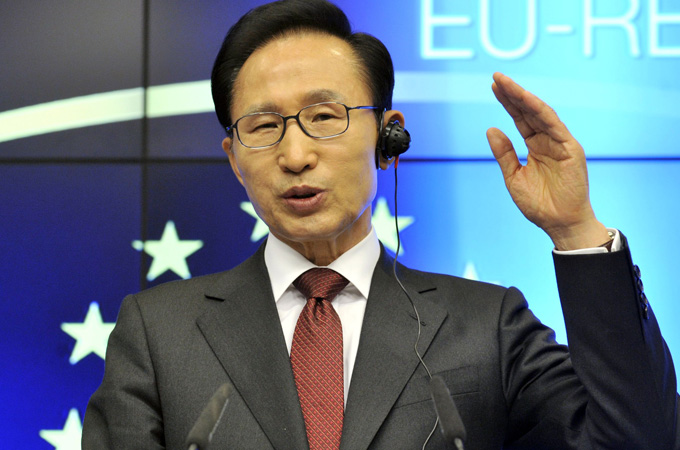S Korea signs trade deal with EU
Move could double trade between them and trigger more calls among Asian states for such pacts with the 27-nation bloc.

 |
| The deal with S Korea is regarded as “the most important trade deal ever concluded by the EU with one country” [AFP] |
The European Union and South Korea have signed a free-trade deal which could double trade between them and trigger more calls among Asian states for such pacts with the 27-nation bloc.
The accord, signed on Wednesday, is Europe’s first with an Asian nation, and is set to take effect on July 1, once ratified by the European parliament.
Keep reading
list of 4 itemsEcuador weighs security, international arbitration in latest referendum
‘Triple spending’: Zimbabweans bear cost of changing to new ZiG currency
Boeing hit with 32 whistleblower claims, as dead worker’s case reviewed
“This agreement is by far the most important trade deal ever concluded by the European Union with one country,” Jose Manuel Barroso, the European Commission president said.
Lee Myung-bak, the South Korean president, said the deal would enable South Korea’s economy to grow at more than 5 per cent per year, create thousands of jobs and set a model for EU-Asia relations.
Gaining approval by the European parliament was now a top priority, Herman Van Rompuy, the EU president said.
“We will do everything we can to have an approval of the parliament as soon as possible,” he said.
European countries that are home to car producers – led by Italy – still have reservations about a deal, and these may resurface before ratification by the European Parliament.
Once launched, the deal will eliminate $2.2 billion of duties a year for EU exporters to South Korea, and tackle non-tariff barriers, including regulations and standards in sectors such as automotive, drugs and consumer electronics.
The EU runs a deficit with South Korea in goods trade, although trends suggest the Korean market offers significant growth potential for European firms.
Hurdles and loopholes ahead
A deal must still be approved by the European Union and Korean parliaments, where concerns still run high about the impact of the agreement on carmakers on both sides.
The European parliament is also still drafting a separate regulation that would allow the EU to snap shut its borders to cheap South Korean cars in the event of a surge of imports.
It is not yet clear who could demand the imposition of such “safeguard measures”, nor in what circumstances.
“We will be watching very closely whether the conditions that have been promised will be met,” said Sigrid de Vries, from the European Automobile Manufacturers’ Association.
“The agreement could create an unfair competitive advantage, which would set a negative precedent in Europe’s trade negotiations with other partners, such as India.”
Of particular concern is whether the United States – which is still in talks for a deal with South Korea – will be able to extract greater concessions.
EU industry players want clauses in the deal to ensure South Korea matches any such concessions.
South Korea is under pressure to drop plans for an environmental bill that could hinder EU exports of large gas-guzzling cars.
Japan and US worried
The United States and Japan worry that the EU-Korean deal may hurt sales of their products in Asia and Europe.
“Today’s signing of the EU-South Korea free trade agreement is a stark reminder that American exporters and workers are in danger of falling further behind as other countries complete free trade agreements without us,” Dave Camp, the US Republican congressman said in a statement.
Japanese manufacturers worry that they stand to lose market share in Europe’s automotive and electronics markets.
“Korea and Japan are competitors in some industries, so Japanese companies will face a difficult situation on the European market. So there is an urgent need for us to have (a free-trade agreement) with the European Union,” a Japanese government official told reporters in Brussels this week.
Japan has promised greater EU access to public works contracts, pharmaceuticals and medical equipment markets, to coax the bloc into free-trade talks, the official said.
With global trade talks at the World Trade Organization at an impasse, the EU has focused on bilateral deals.
The bloc is currently in free trade talks with India, Singapore and Malaysia, and less formal discussions with Vietnam and Thailand.